President Emmerson Mnangagwa recently announced a raft of measures that he says are necessary to stabilize the exchange rate.
Flanked by Finance Minister Mthuli Ncube and RBZ governor John Mangudya, Mnangagwa said “strong fundamentals” such as forex inflows show that the “recent exchange rate depreciation is driven by factors outside the obtaining economic fundaments. This is comparable to the work of economic hitmen”.
The new measures make using USD more expensive, an attempt to ease pressure on the Zimdollar. But measures on banks, money supply and the stock market may brew fresh uncertainty.
Here, newZWire summarises some of the steps announced.
Bank Lending Suspended
All bank lending, whether to government or private sector, has been suspended. This unprecedented move is “to minimize money creation of broad money that is prone to abuse for speculative purposes”, Mnangagwa said in his statement. RBZ had only recently increased interest rates to 80% hoping to limit money supply growth.
This will have a major impact on businesses – both large and small – and banks, whose main job is lending.
According to RBZ data, total loans and advances grew 179% in 2021, a year in which inflation ended at 61%. Microfinance lenders had over 307 000 customers at the end of the year.
If your business runs into any working capital problems, you cannot, for now, go to your bank for a loan to help with your cash flow. Companies borrow from banks to pay for cash flow, including for payments such paying salaries and bills.
For now, you cannot get a bank loan to start a business. This ban affects even commercial farmers, who rely on banks such as CBZ and the AFC to fund their cropping.
Government has also limited money supply growth targets to 0% per quarter. Roughly, this means RBZ will not be printing any new money, but it also means that there is no new money whatsoever for lending, which may hurt the economy even more.
Such measures are rare. In August, Ethiopia’s central bank temporarily suspended all lending by banks using collateral, citing “economic sabotage”.
New Day, New Rate
Retailers and wholesalers can now use a new “interbank exchange rate”. This is a rate that was introduced in April when RBZ allowed banks to buy or sell forex of up to US$1000 from customers. The limit on this facility has now been bumped up to US$5000 per day and US$10 000 a week.
This is some admission by government that the auction rate is overvalued, and may signal the first steps away from the auction. But the new rate itself is still off the market value. The interbank rate was Z$268 to the US dollar at banks this week, compared to Z$166 at the RBZ’s auction, but still lower than the more widely parallel market rate. Retailers are allowed a variance of 10% on the interbank rate.
Payment of the local part of foreign currency taxes, duties and royalties will now be at the new interbank rate.
RBZ will no longer auction forex that it does not have, and it must settle allotments within 14 days. Government says it is making money available to clear the auction backlog by the end of May.
Using USD Just Got More Expensive
Government has made moves to try and make it more expensive to use US dollars.
Electronic transactions for local currency will continue to attract the 2% tax. But if you transfer USD locally, you will now have to pay a 4% transaction. If you withdraw USD cash of above US$1000, you will now pay a levy of 2% per transaction, up from 5 cents per transaction.
A Half-Measure For Exporters
Exporters have to sell 40% of their export earnings at the official rate. Previously, they got that money at the auction rate. Now, that 40% will be paid the interbank rate. While exporters now get more, it is unlikely to satisfy them. They have called for the total removal of the foreign currency retention system completely, saying it is losing them value.
Sticking To Current Forex System
The government is sticking to the dual currency system. Collection of revenue in USD will continue to support spending, such as the importation of vaccines, infrastructure, or paying debts. De-dollarisation will be “carefully managed”, Mnangagwa said.
Stock Exchange: Scapegoat?
Government says there has been “regulatory weakness” on the ZSE that is helping fuel market speculation.
Brokers can no longer transfer funds from one client sub-account to another. Transfer out of a client sub-account will only be to the client’s account, and not to another person’s account.
Government says current taxes do not encourage traders to hold shares for a long period of time, causing “speculative bubbles”. Shares sold before 9 months will now attract 40% capital gains tax. This will force investors to hold shares for longer.
The ZSE came under attack last week from ZANU PF spokesman Chris Mutsvangwa, who accused brokers of taking payment in US dollars from clients to buy shares on the ZWL-denominated ZSE.
Transport: Kombi U-turn
Government is again opening public transport to private players, hoping to ease a crisis bought by its imposition of the ZUPCO monopoly. Government will allow for duty-free importation, for 12 months, on vehicles that meet regulations to be issued. newZWire
 Nhau News Online News that is accurate, reliable, trustworthy!!
Nhau News Online News that is accurate, reliable, trustworthy!!
